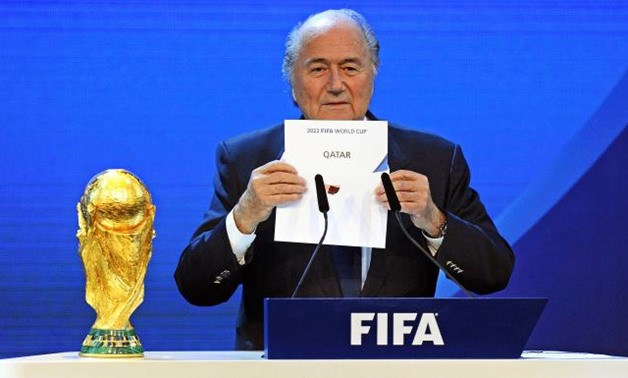
Former FIFA president, Joseph Blatter – press photo
CAIRO – 6 August 2018: The bizarre decision to award the 2022 World Cup to Qatar, taken in late 2010, was found to be driven by corruption as former president of the body that runs world football, Joseph Blatter, claimed that his fellow executive committee members overlooked advice that Qatar was incapable of hosting the tournament.
The Sunday Times reported that Blatter alleged that Qatar’s win was a result of a “combination of a rule-breaking collusion deal and political pressure” exerted on Michel Platini, the French member of FIFA executive committee. The claims were made in Blatter’s recently published book (My Truth), the 82-year-old’s defense of his 17-year reign as FIFA president, which ended with a six-year ban from football.
FIFA is coming under pressure to reopen its investigation of how Qatar was awarded the right to host the 2022 World Cup, after revelations that its bid team ran a “black operations” campaign against its rivals.
A senior source close to FIFA’s ethics committee has confirmed that none of the information about the campaign revealed by The Sunday Times last week had been made available to the inquiry into Qatar that ended four years ago.
The source said FIFA should now suspend key members of the Qatar bid while it looked into the allegations but claimed that the sports body’s ethics arm had become less independent under the current president, Gianni Infantino.
Last Month, The Sunday Times reported that it had been passed documents by a whistleblower who worked with the Qatar bid.
It reported claims that the bid team used a PR agency and former CIA operatives to disseminate fake propaganda about its main competitors, the USA and Australia, in a flagrant breach of the rules set down for bidding countries by football’s world governing body.

Emir of Qatar, Sheikh Tamim Bin Hamad Al-Thani
Qatar beat rival bids from the US, Australia, South Korea and Japan eight years ago to win the right to host the competition, and has faced questions over its shock win since.
The alleged smears against rival bidders reportedly involved recruiting prominent figures to criticize the bids in their own countries, thus giving the impression they lacked support at home.
About a year ago, Qatar was hit by its biggest diplomatic crisis after multiple Arab nations, including Egypt, Saudi Arabia, the UAE and Bahrain cut ties with Qatar, accusing it of destabilizing the region with its support for Islamist groups.
The Arab quartet halted all land, air and sea traffic with Qatar, and withdrew their diplomats and ambassadors from the Qatari peninsula. The Arab quartet issued 13 demands to Doha – then shortened to six principles - including closing Al Jazeera television, curbing relations with Iran and shutting down a Turkish military base.
The four Arab countries severed relations with Doha over what they say was its close links to Iran, which has been accused of interfering in Arab countries’ affairs and being behind terrorist plots. Doha restored full diplomatic relations with Tehran amid the crisis.
One major disagreement between Qatar and its neighbors has been the former’s support for the Muslim Brotherhood, which has been outlawed as a terrorist group by the boycotting countries.
Since the eruption of the crisis, Qatar showed no intention of solving the strife. However, Qatar placed several people and entities on its terrorism list in March, including several Qatari nationals already blacklisted by the Arab quartet that accused Doha of supporting militants. Qatar’s issuance of a terror list of 19 individuals and eight entities has done little to impress decision-makers in the four Arab countries.
Comments
Leave a Comment